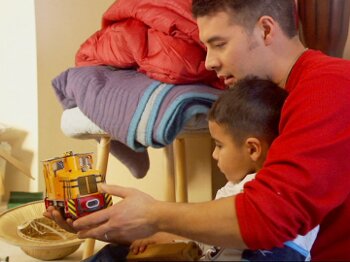Stories are a great way to connect!
“That’s a picture of Grammy when she was a little girl. She loved horses, especially her horse, Black Jack. She rode him every day! What do you think it would be like to ride a horse?”
Stories connect you to your children and them to the world around them. Some stories have a beginning, middle, and end, but not always! Everyday conversations are a type of story too. And when you talk about your child’s world, it sparks her interest! She learns how to take a small thought and build on it. She’s learning how to have a conversation, and she’s building her vocabulary. Storytelling not only teaches her new words but it also teaches her how to listen and pay attention.
Make your child the star of the story!
Children love being part of the story. Try making up a story describing his day as if he was a make-believe character. As your child grows, share all kinds of stories – stories about you and make-believe stories. Let your imagination go and encourage your child to add to the story or create his own. You will find that he wants to hear them over and over. And be sure to share interesting things about your family history and customs. It’s a good way to keep traditions and memories alive.
Build on your child’s questions.
“What’s this?” your child asks as he picks up an old train engine. “An old train,” you answer, but the conversation might stop there. Instead, tell him more of the story, like “Your grandpa, a conductor on the train in Omaha, built this train. What do you think it would be like to be a conductor?” You are keeping the conversation going. And if it leads to more questions, be sure to answer them.
A curious child is interested in learning. So try to notice what he notices. If he is interested in baseball, talk about the players or the time you played on a muddy field. Suggest that he talk to other grownups about baseball or take him to the library for books on his favorite team. When you encourage his interest, you build a love of learning. Sharing stories is a wonderful way to make connections with your child.
Use stories to help deal with feelings.
Stories can help a child understand situations or deal with feelings. If a child is upset, you can share with him a time that you were upset. Or use pretend characters and make up a story in a similar situation and talk about how they dealt with their feelings. If a child has a favorite stuffed animal, sometimes it helps to talk about things or solve problems through the animal’s voice, like “Do you think Fluffy would be sad if you couldn’t play?” Taking the time to share personal stories and listen to your child’s stories tells him that you care about him and value his feelings.
Helpful parenting tips
Have fun with storytelling! Be creative. You might say, “Once upon a time, there was a very silly princess who only drank her tea sitting on a plaid blanket with a tiny green cup.” By sharing stories, you tell your child that she is important.
- Your home is full of stories to be told about things she can see, hear and touch.
- Pay close attention to what he says. When he shows an interest in something, follow his lead and keep the conversation going.
- Children love hearing stories about when they were babies. Be sure to tell your favorite stories again and again.
- Invite children into adult conversations when it makes sense.
- Show him you know how to listen too!
Be your child’s favorite storyteller!

